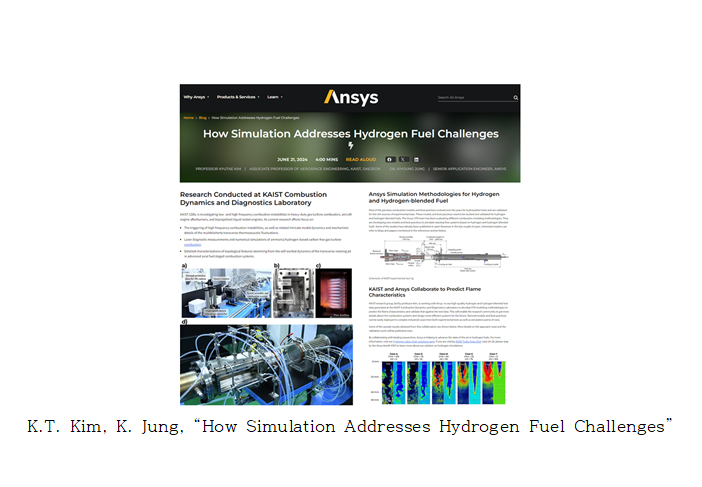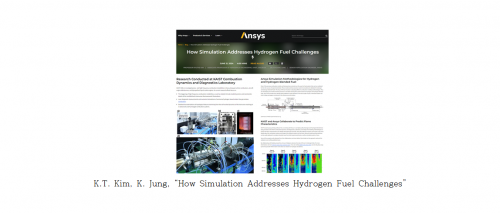Major research outcome
- KAIST-Ansys research collaboration for hydrogen combustion model development
- 관리자 |
- 2025-03-17 13:25:36|
- 107
- 2025-03-17 13:25:36|
As the demand for carbon-neutral energy solutions intensifies, hydrogen has emerged as a key fuel for next-generation gas turbine technology. Unlike conventional hydrocarbon fuels, hydrogen is carbon-free, with no direct carbon dioxide emissions. Hydrogen’s distinct physical properties, including low ignition energy and extended flammability range, play a crucial role in enhancing gas turbine performance and efficiency. Despite these advantages, the use of hydrogen presents significant technical challenges. For example, high reactivity and fast flame propagation speed increase the likelihood of flashback, while its low Lewis number tends to make hydrogen-powered systems more susceptible to high-frequency instabilities. Since most computational combustion models have been developed for hydrocarbon fuels, new models are needed to accurately predict the behaviors of hydrogen-fueled gas turbines.
Prof. Kim’s research team has been closely collaborating with Ansys, a global leader in engineering simulation, to develop an advanced predictive framework for hydrogen-fueled gas turbine combustion using large eddy simulations. Recently, the KAIST-Ansys research team developed a new model by rigorously validating the computational modeling approach against high-precision experimental data. The new model is expected to provide powerful predictive capabilities for simulating complex reacting flow fields, ultimately enabling the development of carbon-neutral high-efficiency hydrogen-fueled gas turbines. These results were posted on the Ansys’ official website:
https://www.ansys.com/blog/how-simulation-addresses-hydrogen-fuel-challenges
Prof. Kim’s research team has been closely collaborating with Ansys, a global leader in engineering simulation, to develop an advanced predictive framework for hydrogen-fueled gas turbine combustion using large eddy simulations. Recently, the KAIST-Ansys research team developed a new model by rigorously validating the computational modeling approach against high-precision experimental data. The new model is expected to provide powerful predictive capabilities for simulating complex reacting flow fields, ultimately enabling the development of carbon-neutral high-efficiency hydrogen-fueled gas turbines. These results were posted on the Ansys’ official website:
https://www.ansys.com/blog/how-simulation-addresses-hydrogen-fuel-challenges

| Attach File |
|---|


